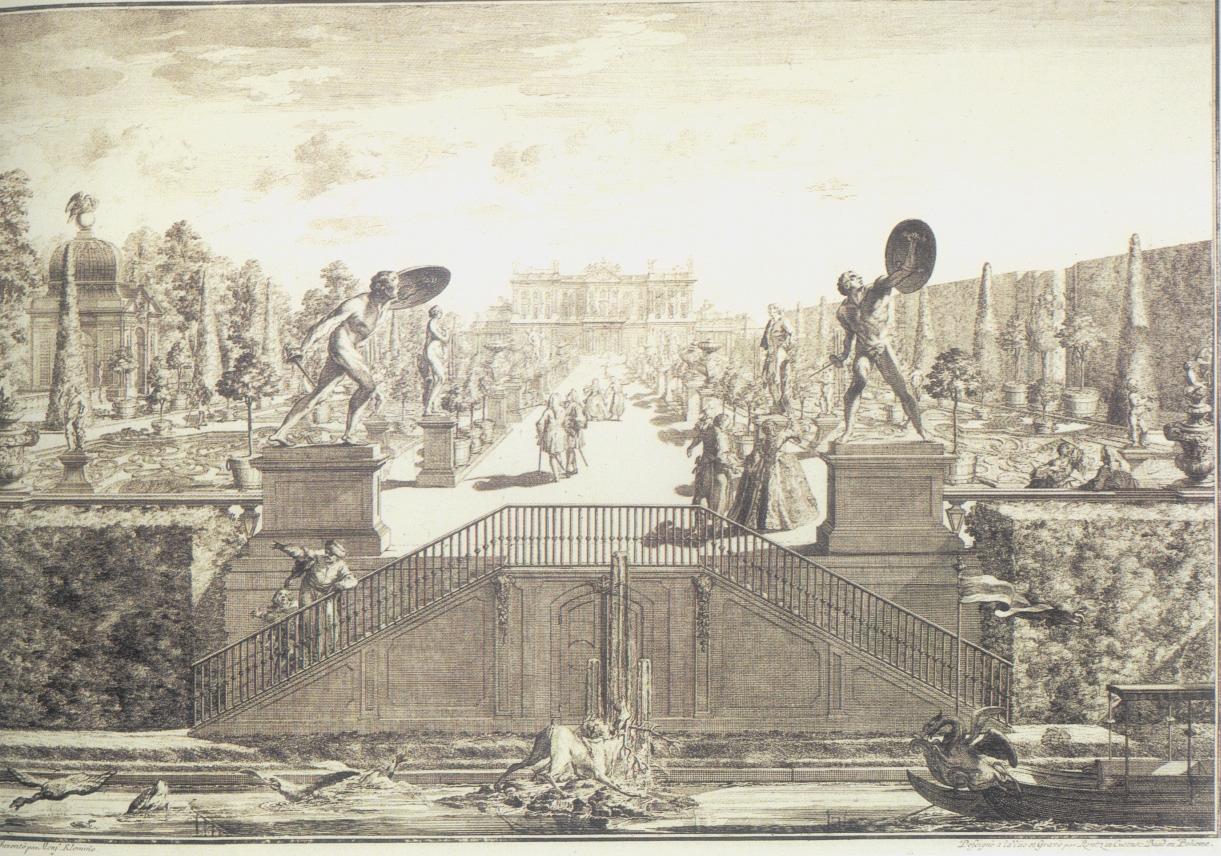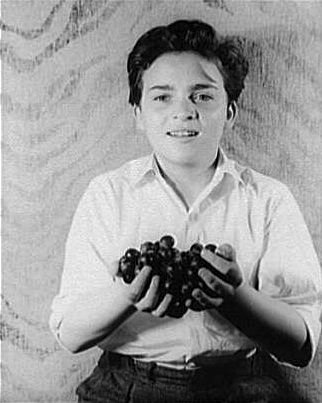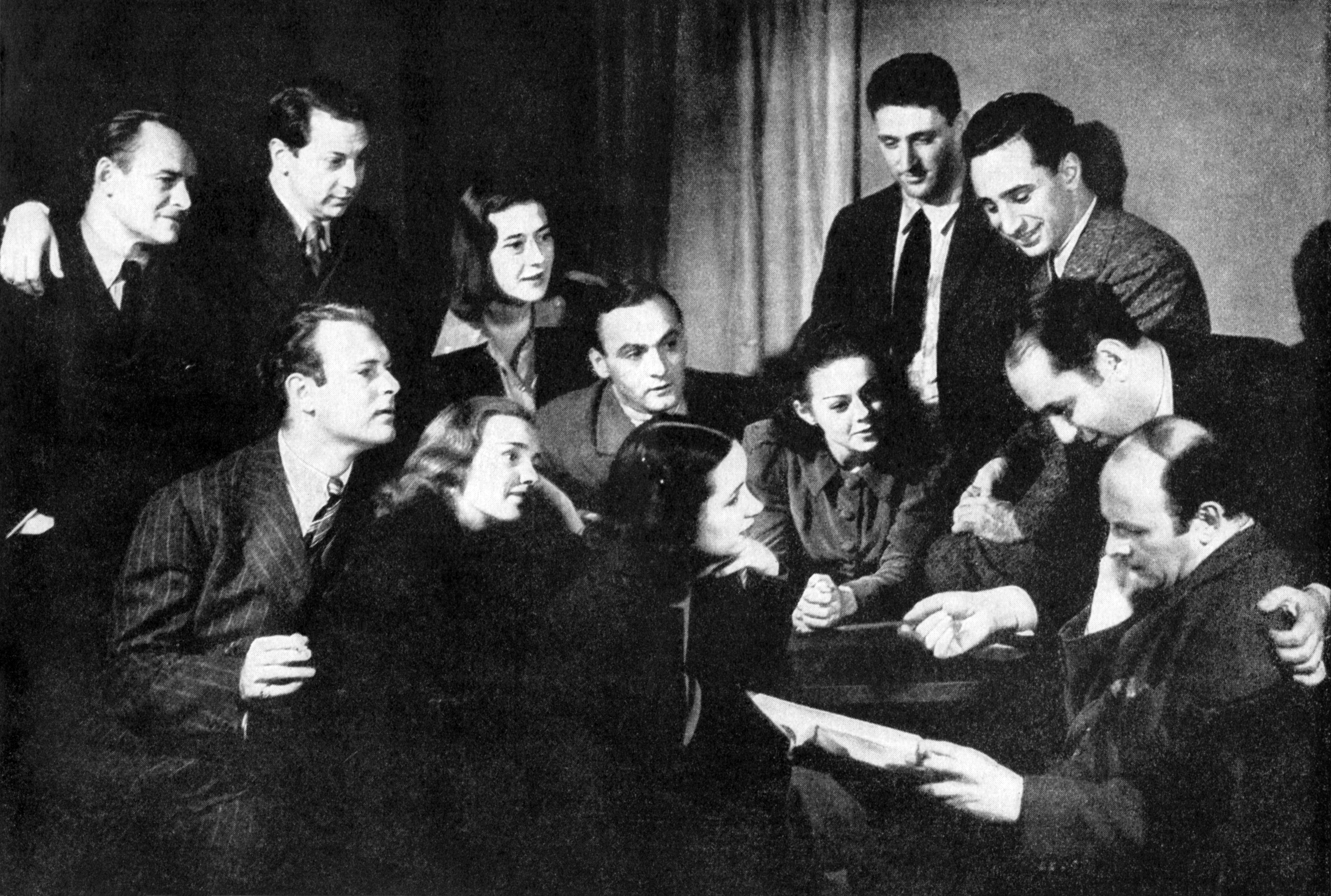|
Boris Kaufman
Boris Abelevich Kaufman, A.S.C. (russian: Бори́с А́белевич Ка́уфман; August 24, 1906 – June 24, 1980) was a Russian-born American cinematographer and the younger brother of Soviet filmmakers Dziga Vertov and Mikhail Kaufman. Life and career Kaufman was born into a family of Jewish intellectuals in Białystok when Congress Poland was part of the Russian Empire. After the Bolshevik Revolution of 1917, Poland regained its independence, and Boris moved there with his parents. Mikhail and Denis, better known as Dziga Vertov, stayed in the Soviet Union and became important filmmakers, producing avant-garde and agitprop films. The brothers later stayed in touch primarily by letters; Vertov visited Boris Kaufman in Paris twice, in 1929 and 1931. After graduating from the University of Paris, Kaufman turned to cinematography, collaborating with Jean Vigo and Dimitri Kirsanoff. During World War II, he served in the French Army against the Nazis; when France fe ... [...More Info...] [...Related Items...] OR: [Wikipedia] [Google] [Baidu] |
Białystok
Białystok is the largest city in northeastern Poland and the capital of the Podlaskie Voivodeship. It is the tenth-largest city in Poland, second in terms of population density, and thirteenth in area. Białystok is located in the Białystok Uplands of the Podlachian Plain on the banks of the Biała River, by road northeast of Warsaw. It has historically attracted migrants from elsewhere in Poland and beyond, particularly from Central and Eastern Europe. This is facilitated by the nearby border with Belarus also being the eastern border of the European Union, as well as the Schengen Area. The city and its adjacent municipalities constitute Metropolitan Białystok. The city has a warm summer continental climate, characterized by warm summers and long frosty winters. Forests are an important part of Białystok's character and occupy around (18% of the administrative area of the city) which places it as the fifth-most forested city in Poland. The first settlers arrived in th ... [...More Info...] [...Related Items...] OR: [Wikipedia] [Google] [Baidu] |
Agitprop
Agitprop (; from rus, агитпроп, r=agitpróp, portmanteau of ''agitatsiya'', "agitation" and ''propaganda'', "propaganda") refers to an intentional, vigorous promulgation of ideas. The term originated in Soviet Russia where it referred to popular media, such as literature, plays, pamphlets, films, and other art forms, with an explicitly political message in favor of communism. The term originated in Soviet Russia as a shortened name for the Department for Agitation and Propaganda (, '), which was part of the central and regional committees of the Communist Party of the Soviet Union. Within the party apparatus, both agitation (work among people who were not Communists) and propaganda (political work among party members) were the responsibility of the ''agitpropotdel'', or APPO. Its head was a member of the MK secretariat, although they ranked second to the head of the ''orgraspredotdel''. Typically Russian agitprop explained the ideology and policies of the Communist Par ... [...More Info...] [...Related Items...] OR: [Wikipedia] [Google] [Baidu] |
12 Angry Men (1957 Film)
''12 Angry Men'' is a 1957 American courtroom drama film directed by Sidney Lumet, adapted from a 1954 teleplay of the same name by Reginald Rose. The film tells the story of a jury of 12 men as they deliberate the conviction or acquittal of a teenager charged with murder on the basis of reasonable doubt; disagreement and conflict among them force the jurors to question their morals and values. It stars Henry Fonda (who also produced the film with Reginald Rose), Lee J. Cobb, Ed Begley, E. G. Marshall, and Jack Warden. ''12 Angry Men'' explores many techniques of consensus-building and the difficulties encountered in the process among this group of men whose range of personalities adds to the intensity and conflict. The jury members are identified only by number; no names are revealed until an exchange of dialogue at the very end. The film forces the audience to evaluate their own self-image through observing the personalities, experiences, and actions of the jurors. The film ... [...More Info...] [...Related Items...] OR: [Wikipedia] [Google] [Baidu] |
Sidney Lumet
Sidney Arthur Lumet ( ; June 25, 1924 – April 9, 2011) was an American film director. He was nominated five times for the Academy Award: four for Best Director for '' 12 Angry Men'' (1957), '' Dog Day Afternoon'' (1975), '' Network'' (1976), and '' The Verdict'' (1982) and one for Best Adapted Screenplay for '' Prince of the City'' (1981). He did not win an individual Academy Award, but did receive an Academy Honorary Award, and 14 of his films were nominated for Oscars. According to ''The Encyclopedia of Hollywood'', Lumet was one of the most prolific filmmakers of the modern era, directing more than one movie a year on average since his directorial debut in 1957. Turner Classic Movies notes his "strong direction of actors", "vigorous storytelling" and the "social realism" in his best work. Film critic Roger Ebert described him as "one of the finest craftsmen and warmest humanitarians among all film directors".Ebert, Roger"Sidney Lumet: In memory"''Chicago Sun Times,'' ... [...More Info...] [...Related Items...] OR: [Wikipedia] [Google] [Baidu] |
Baby Doll
''Baby Doll'' is a 1956 American dramatic black comedy film directed by Elia Kazan, and starring Carroll Baker, Karl Malden, and Eli Wallach. It was produced by Kazan and Tennessee Williams, and adapted by Williams from his own one-act play ''27 Wagons Full of Cotton'' (1955). The plot focuses on a feud between two rival cotton gin owners in rural Mississippi; after one of the men commits arson against the other's gin, the owner retaliates by attempting to seduce the arsonist's 19-year-old virgin bride with the hopes of receiving an admission by her of her husband's guilt. Filmed in Mississippi in late 1955, ''Baby Doll'' was released in December 1956. It provoked significant controversy, largely due to its implied sexual themes. An effort to ban the film was carried out by the Roman Catholic advocacy group National Legion of Decency, though responses to the group's condemnation of the film were varied among Catholic laity and other religious institutions. Despite moral object ... [...More Info...] [...Related Items...] OR: [Wikipedia] [Google] [Baidu] |
Golden Globe Award
The Golden Globe Awards are accolades bestowed by the Hollywood Foreign Press Association beginning in January 1944, recognizing excellence in both American and international film and television. Beginning in 2022, there are 105 members of the HFPA. The annual ceremony at which the awards are presented is normally held every January and has been a major part of the film industry's awards season, which culminates each year in the Academy Awards, although the Golden Globes' relevance has been declining in recent years. The eligibility period for the Golden Globes corresponds to the calendar year (from January 1 through December 31). History The Hollywood Foreign Press Association (HFPA) was founded in 1943 by Los Angeles-based foreign journalists seeking to develop a better organized process of gathering and distributing cinema news to non-U.S. markets. One of the organization's first major endeavors was to establish a ceremony similar to the Academy Awards to honor film achi ... [...More Info...] [...Related Items...] OR: [Wikipedia] [Google] [Baidu] |
Academy Award For Best Cinematography
The Academy Award for Best Cinematography is an Academy Award awarded each year to a cinematographer for work on one particular motion picture. History In its first film season, 1927–28, this award (like others such as the acting awards) was not tied to a specific film; all of the work by the nominated cinematographers during the qualifying period was listed after their names. The problem with this system became obvious the first year, since Karl Struss and Charles Rosher were nominated for their work together on ''Sunrise'' but three other films shot individually by either Rosher or Struss were also listed as part of the nomination. In the second year, 1929, there were no nominations at all, although the Academy has a list of unofficial titles that were under consideration by the Board of Judges. In the third year, 1930, films, not cinematographers, were nominated, and the final award did not show the cinematographer's name. Finally, for the 1931 awards, the modern syste ... [...More Info...] [...Related Items...] OR: [Wikipedia] [Google] [Baidu] |
On The Waterfront
''On the Waterfront'' is a 1954 American crime drama film, directed by Elia Kazan and written by Budd Schulberg. It stars Marlon Brando and features Karl Malden, Lee J. Cobb, Rod Steiger, Pat Henning, and Eva Marie Saint in her film debut. The musical score was composed by Leonard Bernstein. The film was inspired by "Crime on the Waterfront" by Malcolm Johnson, a series of articles published in November–December 1948 in the '' New York Sun'' which won the 1949 Pulitzer Prize for Local Reporting, but the screenplay by Budd Schulberg is directly based on his own original story. The film focuses on union violence and corruption amongst longshoremen, while detailing widespread corruption, extortion, and racketeering on the waterfronts of Hoboken, New Jersey. ''On the Waterfront'' was a critical and commercial success. It received twelve Academy Award nominations and won eight, including Best Picture, Best Actor for Brando, Best Supporting Actress for Saint, and Best Direct ... [...More Info...] [...Related Items...] OR: [Wikipedia] [Google] [Baidu] |
Elia Kazan
Elia Kazan (; born Elias Kazantzoglou ( el, Ηλίας Καζαντζόγλου); September 7, 1909 – September 28, 2003) was an American film and theatre director, producer, screenwriter and actor, described by ''The New York Times'' as "one of the most honored and influential directors in Broadway and Hollywood history". Born in Constantinople (now Istanbul), to Cappadocian Greek parents, his family came to the United States in 1913. After attending Williams College and then the Yale School of Drama, he acted professionally for eight years, later joining the Group Theatre in 1932, and co-founded the Actors Studio in 1947. With Robert Lewis and Cheryl Crawford, his actors' studio introduced " Method Acting" under the direction of Lee Strasberg. Kazan acted in a few films, including '' City for Conquest'' (1940). His films were concerned with personal or social issues of special concern to him. Kazan writes, "I don't move unless I have some empathy with the basic theme." ... [...More Info...] [...Related Items...] OR: [Wikipedia] [Google] [Baidu] |
National Film Board Of Canada
The National Film Board of Canada (NFB; french: Office national du film du Canada (ONF)) is Canada's public film and digital media producer and distributor. An agency of the Government of Canada, the NFB produces and distributes documentary films, animation, web documentaries, and alternative dramas. In total, the NFB has produced over 13,000 productions since its inception, which have won over 5,000 awards. The NFB reports to the Parliament of Canada through the Minister of Canadian Heritage. It has bilingual production programs and branches in English and French, including multicultural-related documentaries. History Canadian Government Motion Picture Bureau The Exhibits and Publicity Bureau was founded on 19 September 1918, and was reorganized into the Canadian Government Motion Picture Bureau in 1923. The organization's budget stagnated and declined during the Great Depression. Frank Badgley, who served as the bureau's director from 1927 to 1941, stated that the bu ... [...More Info...] [...Related Items...] OR: [Wikipedia] [Google] [Baidu] |
John Grierson
John Grierson (26 April 1898 – 19 February 1972) was a pioneering Scottish documentary maker, often considered the father of British and Canadian documentary film. In 1926, Grierson coined the term "documentary" in a review of Robert J. Flaherty's '' Moana''.Ann Curthoys, Marilyn Lakebr>Connected worlds: history in transnational perspective, Volume 2004p.151. Australian National University Press Early life Grierson was born in the old schoolhouse in Deanston, near Doune, Scotland, to schoolmaster Robert Morrison Grierson from Boddam, near Peterhead, and Jane Anthony, a teacher from Ayrshire. His mother, a suffragette and ardent Labour Party activist, often took the chair at Tom Johnston's election meetings. The family moved to Cambusbarron, Stirling, in 1900, when the children were still young, after Grierson's father was appointed headmaster of Cambusbarron school. When the family moved, John had three elder sisters, Agnes, Janet, and Margaret, and a younger brot ... [...More Info...] [...Related Items...] OR: [Wikipedia] [Google] [Baidu] |
Nazi Germany
Nazi Germany (lit. "National Socialist State"), ' (lit. "Nazi State") for short; also ' (lit. "National Socialist Germany") (officially known as the German Reich from 1933 until 1943, and the Greater German Reich from 1943 to 1945) was the German Reich, German state between 1933 and 1945, when Adolf Hitler and the Nazi Party controlled the country, transforming it into a dictatorship. Under Hitler's rule, Germany quickly became a totalitarian state where nearly all aspects of life were controlled by the government. The Third Reich, meaning "Third Realm" or "Third Empire", alluded to the Nazi claim that Nazi Germany was the successor to the earlier Holy Roman Empire (800–1806) and German Empire (1871–1918). The Third Reich, which Hitler and the Nazis referred to as the Thousand-Year Reich, ended in May 1945 after just 12 years when the Allies of World War II, Allies defeated Germany, End of World War II in Europe, ending World War II in Europe. On 30 January 1933, H ... [...More Info...] [...Related Items...] OR: [Wikipedia] [Google] [Baidu] |




.jpg)


